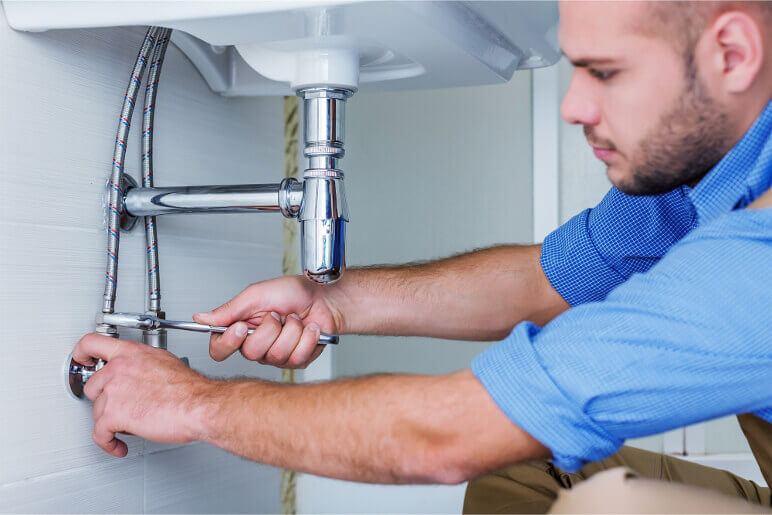
Stay Ahead of Plumbing Problems with These 6 Tips
Plumbing problems can be a major headache for any homeowner. From clogged drains to burst pipes, these issues can not only disrupt your daily routine but also cause significant damage to your home. While it’s always a good idea to have a reliable plumber on speed dial, there are some simple steps you can take to stay ahead of potential plumbing problems. In this blog post, we’ll share 6 expert tips to help you keep your plumbing in top shape and avoid costly repairs in the future. Read on to learn how you can be proactive in maintaining your plumbing system and save yourself from the stress of unexpected plumbing emergencies.
Know Your Plumbing System Well
One of the most important steps you can take to stay ahead of potential plumbing problems is to know your plumbing system well. Understanding how your plumbing system works and being familiar with its components can help you identify and address issues before they turn into major problems.
Start by locating your main water shut-off valve. This valve is crucial in case of an emergency or if you need to perform any maintenance or repairs on your plumbing system. Make sure everyone in your household knows where it is located and how to operate it.
Next, familiarize yourself with the layout of your pipes and plumbing fixtures. Take note of any exposed pipes, especially in basements and crawl spaces, as these are prone to freezing and bursting in colder climates. Insulating these pipes can help prevent costly damage.
Additionally, educate yourself on the signs of common plumbing problems such as leaks, low water pressure, and clogged drains. Knowing what to look for can help you catch issues early on and avoid further damage.
By taking the time to understand your plumbing system, you can be better prepared to address any potential issues and minimize the risk of expensive repairs down the line.
Regularly Check for Leaks
Regularly checking for leaks is a crucial step in maintaining a healthy plumbing system. Even the smallest leak can quickly turn into a major problem if left untreated. To avoid costly repairs and water damage, it’s important to be proactive in checking for leaks throughout your home.
Start by inspecting all visible pipes, faucets, and fixtures for any signs of water. Look for dripping or pooling water, as well as any discoloration or warping of surfaces. Keep an eye out for unusual smells or mold growth, as these can also be indications of a hidden leak.
Next, periodically check your water meter. Turn off all water sources in your home and note the meter reading. Wait a few hours, making sure no one uses any water, and then check the meter again. If the reading has changed, it could be a sign of an undetected leak.
In addition to visual inspections, consider using leak detection devices. These can include water leak alarms, moisture sensors, or even smart home systems that alert you to any abnormal water usage.
Regularly checking for leaks and promptly addressing any issues can help prevent extensive water damage and costly repairs. It’s an essential part of responsible homeownership and can save you from unexpected headaches down the line.
Maintain Your Drains and Pipes
When it comes to maintaining your plumbing system, don’t forget about your drains and pipes. Keeping them in good shape is essential for preventing clogs and other plumbing issues.
First, make sure to clean your drains regularly. Over time, debris such as hair, soap scum, and food particles can build up and cause blockages. Using a drain cleaner or natural remedies like baking soda and vinegar can help keep your drains clear and prevent clogs.
Additionally, be mindful of what goes down your drains. Avoid pouring grease, oil, coffee grounds, and other substances that can solidify and clog your pipes. Instead, dispose of them in the trash or recycle them properly.
In addition to regular cleaning, consider having your pipes professionally inspected and cleaned every few years. This can help remove any buildup and prevent potential blockages in your plumbing system.
Lastly, be cautious about using chemical drain cleaners. While they may provide a quick fix, they can also damage your pipes over time. Opt for natural remedies or consult a professional plumber for safe and effective drain cleaning solutions.
By taking these steps to maintain your drains and pipes, you can avoid clogs, backups, and other plumbing headaches. Keeping your plumbing system running smoothly is a key part of keeping your home in top shape.
Monitor Water Pressure
Proper water pressure is crucial for a well-functioning plumbing system. Too high or too low pressure can lead to a range of issues, from leaks and pipe damage to inefficient water usage. That’s why it’s important to monitor your water pressure regularly.
High water pressure can strain your pipes and cause leaks. To check for high pressure, you can purchase a water pressure gauge from your local hardware store. Simply attach it to an outdoor faucet and turn the water on. The gauge will show you the pressure in pounds per square inch (PSI). If it reads above 80 PSI, you may need to install a pressure regulator to bring it down to a safe level.
On the other hand, low water pressure can indicate a blockage or a leak somewhere in your plumbing system. If you notice a significant decrease in water pressure, it’s important to investigate the issue. Start by checking for any visible leaks or blockages in your pipes or faucets. If you can’t identify the problem, it’s best to call a professional plumber to diagnose and fix the issue.
By monitoring your water pressure regularly, you can catch any issues early on and prevent costly damage to your plumbing system. It’s an essential part of maintaining a healthy plumbing system and ensuring that everything runs smoothly in your home.
Be Careful What You Flush
One crucial aspect of maintaining a healthy plumbing system is being mindful of what you flush down your toilets. It may be tempting to use your toilet as a garbage disposal, but doing so can lead to major plumbing problems. Flushing items that are not designed to be disposed of in this way can result in clogs, backups, and even damage to your pipes.
Toilet paper is specifically designed to break down quickly in water, making it safe to flush. However, other items such as wet wipes, feminine hygiene products, dental floss, cotton balls, and paper towels should never be flushed down the toilet. These items do not break down easily and can cause blockages in your pipes, leading to costly repairs.
It’s also important to be cautious with chemicals and medications. Flushing these substances down the toilet can contaminate your water supply and harm the environment. Instead, dispose of them properly by following the guidelines provided by your local waste management authorities.
By being careful about what you flush, you can prevent clogs and keep your plumbing system running smoothly. Remember, the only things that should be flushed are toilet paper and human waste.
Don’t Ignore Small Problems
When it comes to plumbing problems, ignoring small issues can quickly escalate into big headaches. It’s tempting to brush off a small leak or a slow drain, especially when life gets busy. However, neglecting these small problems can lead to significant damage and costly repairs down the line.
Even the smallest leak can waste a significant amount of water over time. It can also cause mold growth, damage your walls and floors, and even weaken the foundation of your home. Similarly, a slow drain may seem like a minor inconvenience, but it could be a sign of a bigger clog in your plumbing system.
By addressing small problems as soon as they arise, you can save yourself from larger issues in the future. Don’t ignore that drip or slow drain – take the time to investigate and fix the problem. It’s better to spend a little time and money now than to deal with a major plumbing disaster later.
Regular maintenance and prompt repairs are key to preventing plumbing problems from escalating. Keep an eye out for any signs of trouble, such as leaks, unusual odors, or slow drains, and address them immediately. By taking these small steps, you can keep your plumbing system in top shape and avoid the stress and expense of unexpected plumbing emergencies. If you need plumbing Indianapolis, check out Coopers.






